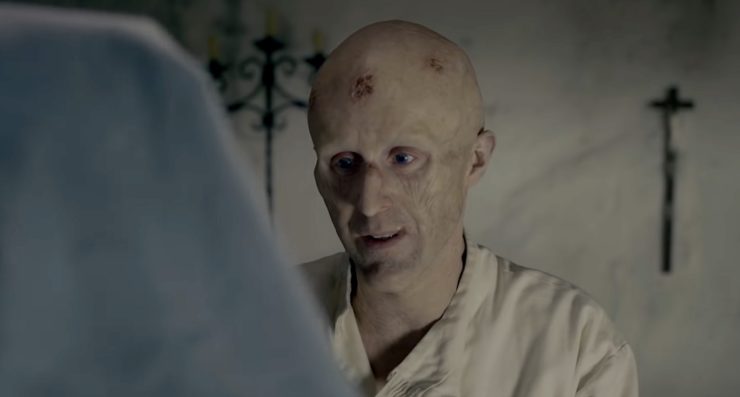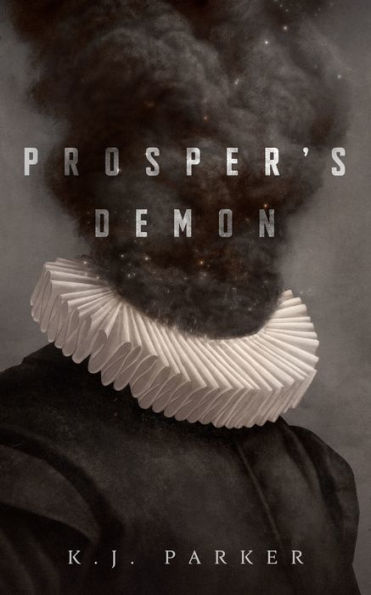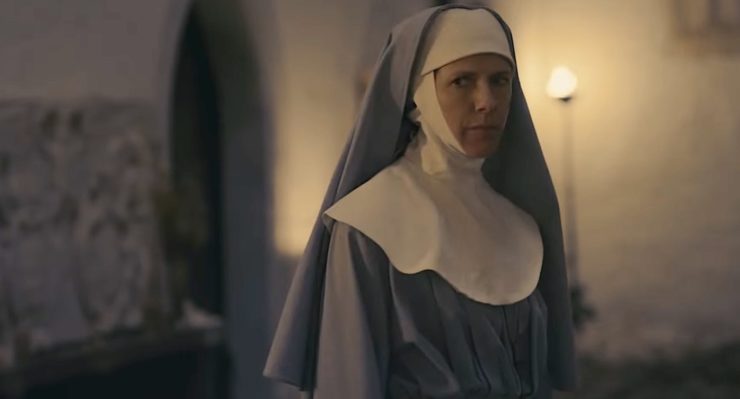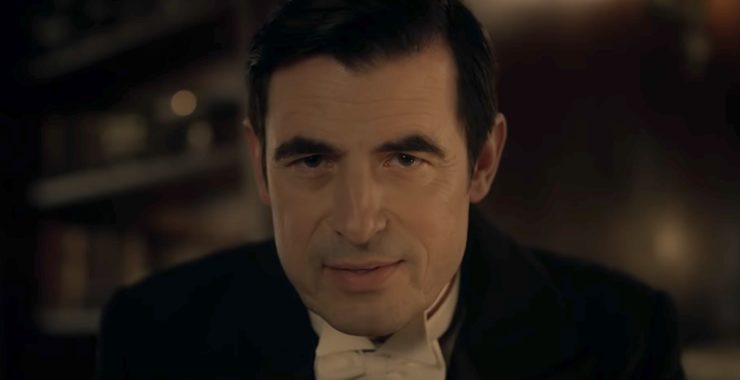Most people have, at one point or another in their lives, enjoyed a vampire story. Or many vampire stories. They are a deliciously uncomfortable paradox as supernatural beings go—bound up in death, but also in lust, in sensuality, and of course, in sex. You can’t really get around it, even if you acknowledge how creepy (even gross or grotesque) the conceit is. Vampires are meant to be attractive to us in order to help us confront something fundamental to much of humanity.
And Bram Stoker’s Dracula may not be the first vampire story, but it is often given credit for the genre’s longevity.
So it should come as no surprise that Sherlock creators Steven Moffat and Mark Gatiss would tackle such a story; the two have already made their love of Victorian literature known, as well as their interest in reimagining these beloved texts for modern viewers. Dracula follows the same format as their erstwhile hit, three 90 minute episodes that are more akin to films. It has many similarities to the Stoker tale, and many little easter eggs for devoted fans.
It’s also a particularly gruesome sort of mess.
[Spoilers for all of Netflix’s Dracula below]
But how is it a mess, you might ask? The problem is, it’s not one thing, or one over-arcing issue. It’s a bunch of little upsets, oddities, and choices that won’t stop tweaking. It starts out benignly enough—Sister Agatha, once a bit character in Stoker’s book, is trying to get a statement from Jonathan Harker about his time in Count Dracula’s castle. But this nun actually carries the surname name Van Helsing (Dolly Wells), and Harker’s account is not quite what is seems.
Our introduction to Claes Bang’s Dracula is reminiscent of Gary Oldman’s grotesque turn in Francis Ford Coppola’s titular film. But a change in vampiric power does away with that similarity quickly; this Dracula takes on aspects of the people he “eats”, which means that he absorbs bits of their personalities and skills after feeding. And for some reason, while Harker is a fairly mild-mannered guy, the act of consuming him imbues the Count with all the subtlety of a Las Vegas magician. All the mystery evaporates, only slightly-off smiles and abrupt transitions left in its wake. This is made even uglier when we learn that this is the Count’s reason for wanting to go to England—the people there are more “educated” and “sophisticated”, you see, and Dracula literally is what he eats. This does lend him the distinction of being the most imperialist-positive, xenophobic take on the character that you’ll probably ever see? So that’s one way to start.
But there’s more! Early in her questioning of Jonathan Harker, Sister Agatha asks him if he’s had sexual relations with Dracula. Now, this is jarring as a question all by itself, but eventually, Harker thinks to ask her why the question came up at all. Agatha points out that he has a “disease”—his skin is decaying and he’s covered in sores—and that she’s merely trying to work out what would have caused it. The thing is, we find out later that Agatha Van Helsing completely aware what caused this state because she’s been seeking evidence of vampires for quite some time. So connecting Harker’s physical state to the possibility of sex with a man ends up reading like a 1980s AIDs scare tactic, much in the manner that David Lynch employed with his portrayal of Baron Harkonnen in Dune. It may not have been the intention, but that’s still how it comes off.

The second episode revolves around Dracula’s trip to the United Kingdom by a ship called the Demeter. This works out much in the same manner as the original tale, with the added presence of Agatha Van Helsing there to make the plot more interesting; she’s playing a game of chess with the Count, goading him into telling her about his trip to England, only to eventually realize that she’s dreaming, and Dracula is holding her on the ship as he drinks her dry along with the rest of the passengers. She manages to stop Dracula and convince the remaining crew to blow up the ship—but Dracula survives in one of his coffins of Transylvanian dirt at the bottom of the ocean, off the coast of England. When he wakes, rejuvenated, he comes to shore and discovers the greatest surprise of all: It’s 2020! And Agatha’s descendant, a woman named Zoe (who looks exactly like her), is waiting for him.
If this is that part where you think “did the creators of Sherlock really just do the exact same thing all over again?” the answer is yes, and I’m sorry, and also—but what did you expect, really? They have one idea, and we’ll all be damned if they aren’t going to use it.
This results in Dracula getting a personal assistant (by turning his lawyer into a vampire) and a cell phone and a ridiculous flat, and using hook-up services to find victims. The rest of the vampire-hunting gang from the novel are now present-day young adults, who are getting up to no good by partying and dealing with ennui and lusting after each other. Jack Seward (Matthew Beard) is smitten in a near-stalkery way with a modern day Lucy Westerna (Lydia West), but we all know that won’t turn out well, especially once Lucy meets the Count. Dr. Zoe Van Helsing is also dying of cancer because… narrative urgency? Her blood is helpfully poison to Dracula because of it, so there’s that. She’s determined to figure Dracula out in ways her ancestor Agatha couldn’t imagine, so she drinks a vial of his blood (“Blood is lives,” Dracula keeps saying, as though it will somehow get more profound every time we hear it) and gains a helpful mental connection with the long-dead nun. She uses Jack—who was a former student of hers—to find about Dracula’s movements and his interest in Lucy, in order to finally beat him at his own game.
Buy the Book


Prosper’s Demon
Said game is actually pretty simple: Dracula is afraid of sunlight and crucifixes and all those little mythical things because he’s decided to believe they’re lethal. Because he’s sacred of death. And once she puts that to him, he realizes that she’s right, and drinks her blood so they can die together.
Um.
It seems as though we’re meant to think the gender swap of Van Helsing from male to female is a profound and forward-thinking choice. Certainly the actor who plays both Agatha and Zoe gives a moving and nuanced performance in both roles, and it’s also exciting to see that they chose a woman who is roughly the same age as the actor playing Dracula himself. But there’s a strange problem in all of this when it comes to how the narrative progresses; in the first episode, Agatha’s primary role is learning Jonathan Harker’s story; in the second episode her primary role is wheedling information out of Count Dracula about his voyage on the Demeter; in the third episode, Zoe’s primary role comes down to helping Dracula understand himself by deconstructing his fears. While there is something of an arc to her story, the narrative still indicates that a woman’s primary function is listening to men’s stories and then perhaps helping them along in their journeys. In effect, Van Helsing’s role in this version of Dracula is not one of a shrewd hunter of monsters—it’s the role of a particularly excellent therapist.
This gets even murkier when we add the sheen of romance that’s imposed upon their relationship at the end of the series, and the creators’ unwillingness to engage with the sexuality inherent in the story they’ve chosen to recreate.
When it was pointed out that one could perceive queer undertones to the show, that Dracula could in fact be counted as bisexual based on his tastes, Steven Moffat was quick to explain otherwise: “He’s bi-homicidal, it’s not the same thing. He’s killing them, not dating them.” This seems a profoundly naive take on the character and what vampires have always represented in the narrative zeitgeist. If the show had gone out of its way to create a particularly asexual version of Dracula, one who didn’t deal in sensuality and lust at all, that would be a different story. But consider: This version of the story calls Dracula’s special prisoners his “brides”—an oft-used term for them, though Stoker himself referred to them in the novel as “sisters”. We then hear Dracula tell Jonathan Harker that he could become his “greatest bride” yet, once he’s turned the man into a vampire. Insisting that the act of murder precludes any discussion of sexuality when we’re having terms and imagery and relationships that are directly associated with sex and intimacy thrust upon us is ultimately a decision to gaslight your audience. You can’t have it both ways.

This also has the unfortunate effect of suggesting that the only reason Van Helsing was reimagined as a woman was to make sure that anything that happened between her and the Count was never viewed as remotely homosexual. It robs the choice to have a female Van Helsing of its power. And what’s more, it’s not as though the original Dracula narrative had no interesting women in it to begin with—Mina Harker drives the majority of the narrative in the novel, a woman sharp enough to create the whole plan to take Dracula out. Here, she’s merely thrust aside and then makes a foundation in the name of her dead fiancé. Huzzah.
This is even worse when we look at Lucy Westerna’s story, the woman in 2020 who Dracula becomes enamored with because she’s not afraid of death. It’s the Count’s obsession with Lucy that helps Zoe/Agatha figure out what he’s truly afraid of, made more obscenely cruel because Lucy is portrayed as this coquettish tease of a woman, one who breaks hearts and dances in short skirts at clubs—when anyone with the slightest understanding of mental health can guess that Lucy is deeply depressed and probably dealing with suicide ideation. The story doesn’t care about this, though. It cares about Dracula’s obsession with her and what that tells us about him.
Oh, and then it has Lucy half-cremated (when she becomes undead and breaks out of her coffin mid-burning), all so that it can use her melted body as a comment on beauty and ownership? She comes to Dracula’s flat, and he insists that she’s his greatest Bride ever for not caring about death, but once she sees her own reflection—from taking a selfie, of course, since mirrors don’t work—she crumples and begs for someone to kill her. Jack obliges and then tells Dracula the truth: She didn’t belong to either of them!
Thank goodness a man learned something about female autonomy in the mutilation and death of this depressed and hurting black woman. Sorry, two men. Dracula does too, I think. Or, he does later, with the death revelation thing. He gets to stand in the sun and stuff. It’s very edgy.
Is there anything salvageable in this Mona Lisa knock-off of a show? It’s enjoyable to watch Agatha Van Helsing’s schtick as an atheist nun, but it’s a small piece of a strange and mealy dinner. There’s no reason to sugarcoat it, or try to make sense of what we were given. Dracula is incomprehensible, and depressing to boot. Maybe the next stab at vampire television will land well, but this is not what we deserved.
Emmet Asher-Perrin did enjoy parts of the second episode because boat murder is fun? You can bug him on Twitter, and read more of her work here and elsewhere.










